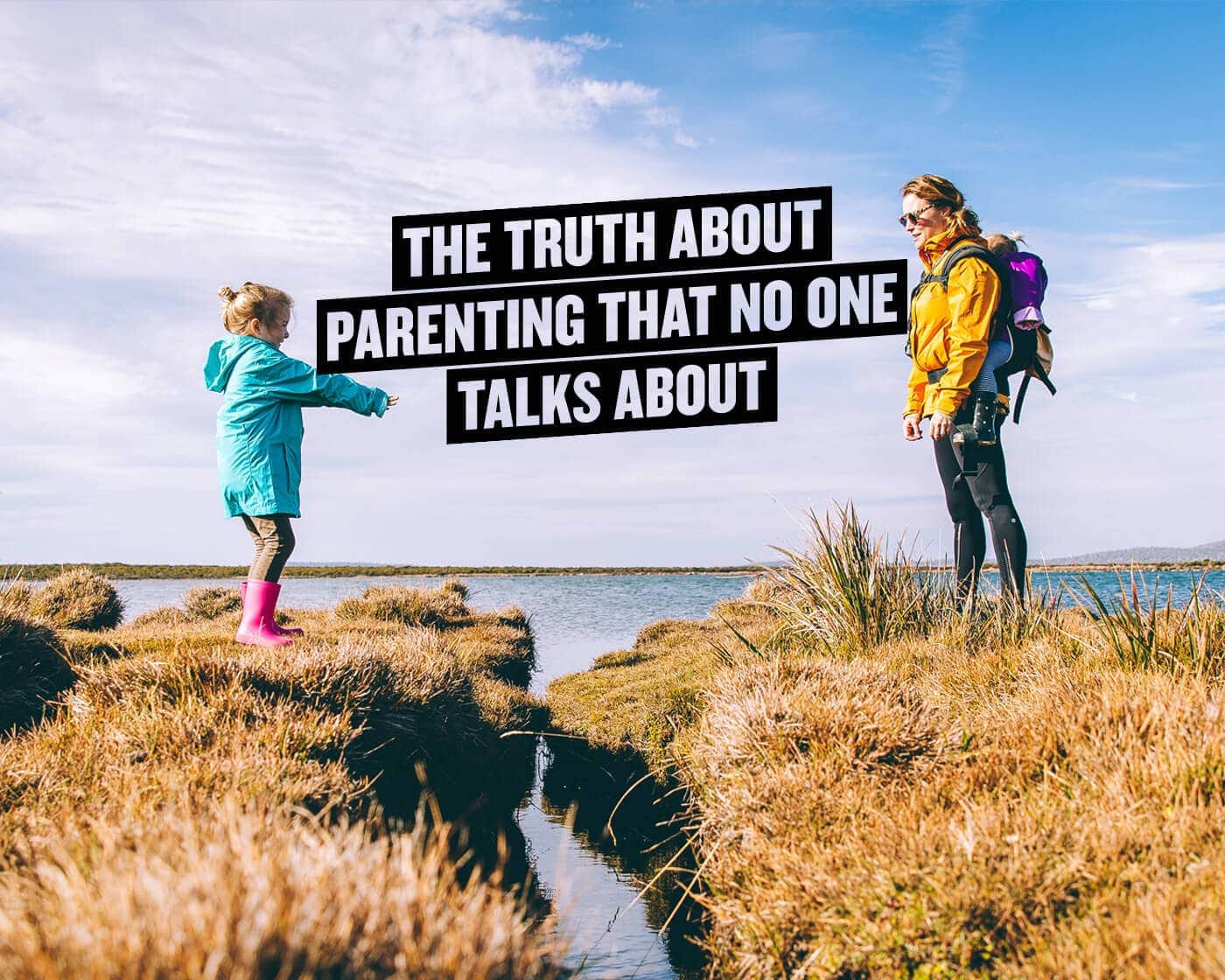In the past year or so, as I’ve been exploring the topic of effective parenting in more detail, I’m noticing that my POVs on the topic are ideas I don’t see others talk about.
The truth is, many people are parenting their kids from a place of insecurity, and treating their kids like “products” instead of actually doing what’s best for them.
But before I get into it, I want to clarify that I don’t want to tell other people how to raise their children. I don’t have the context. Raising kids is super personal, and I don’t want to give blanket advice.
I’m just sharing my opinions and perspectives as someone who was raised by two incredible parents.
The difficult conversation parents need to have with their kids
Your kid’s life is your kid’s life. They’re the ones ultimately in charge. Sure, there are a lot of other important people (like parents) that surround them, but ultimately, it’s their life.
It’s why I’m pushing kids so hard to do what they want to do, even if it goes against what their parents want.
My intent is not to get kids to be disrespectful to their parents, it’s actually the exact opposite — I want kids and parents to have incredible long term relationships. And if a kid is living their life to win on his or her parents’ terms (instead of their own), they’re going to have resentment later in life once they realize they’re not actually happy.
And that’s going to destroy happiness, for both kids and their parents.
1. Allow your child to feel like they can achieve what they want – without handing out “eighth place trophies.”
It doesn’t matter if your kids want to be music producers or basketball players or anything else.
As a parent, creating “permission” is an important idea. If you as a parent, say “yes, you can do this”, it’s a big deal and will make a huge difference in how much they believe in themselves.
It’s how my mom treated me, and it’s how I treat my employees. When I hire someone, I’m incredibly positive and blindly believe in their potential. I’ll trust them to execute. I’ll hype them up and encourage them as much as I can.
But at the same time, I balance that with not handing out “eighth place trophies.”
If your kids want to be producers and they put something out on YouTube and everyone says it sucks, you look at them and say “the market said you suck — let’s try again.” It’s a balance between having blind faith in them and their abilities, but at the same time, letting the results be the results.
It’s stunning to me how many parents do the reverse. So many tell their kid that they probably won’t be a great soccer player, but tell them they “did a great job” when they go on the field and lose 8 – 0.
Many parents don’t understand the idea that you can hold kids accountable for losses and mistakes without making them feel bad about who they are. For example… my mom never made me feel bad about not being good at school. I never felt like I sucked for not being a good student. But I did get grounded every time my report card came out. My mom made it clear that there was a price to be paid for not delivering good grades. And if I didn’t deliver, I had to pay that price.
It was encouragement balanced with practicality. It’s important to create “friction” between the two to put the kids in a good position to win.
2. Stop using your kids’ successes to fix your own insecurities.
We saw this with Hollywood parents in the college scandal that happened – parents paid for their kids to get into the best colleges.
There are a couple of huge problems with this:
- When you do something like that, you mess your kids up. A lot of people talk about how bribing a college to get a seat for your kid takes away seats from other kids (which is true), but the kid who got the seat through a bribe also gets messed up for a lot of reasons.
- They’re creating a “fake environment” for their children. When you reward people for behavior not based on their own merit, you create a huge vulnerability for them later in life.
- They’re showing that they care about what other parents think about their children more than their actual success of their children.
When you use your kids’ accomplishments as the source of your own self-esteem, you end up treating them like “products” more than children.
Please let your kids win on their own terms, not your own.

3. “React” Instead of “Force”
My parents were unbelievably supportive of my ambitions.
But they never “forced” me down any path.
There’s a big difference between the ideas of “reacting” and “forcing” that a lot of parents don’t get. Reacting means giving your kid permission to explore. It means giving your kid rope.
If your child is selling shoes or lemonade and they’re young, all you need to do is react to the fact that they’re already entrepreneurs and give them a lot of rope. Same thing applies if your kid is really into baseball, soccer, art, or anything else.
Reacting is about giving your kid encouragement and support around something they’re already drawn to — and building up “steam” around those actions.
When I was young, I would rip flowers out of people’s yards and sell it back to them. I was making thousands of dollars every weekend selling baseball cards.
My parents’ idea was to encourage me to explore that side of myself.
You can enroll them in theater class, or violin class, painting class, or something else to see if they like it.
But there’s a BIG difference between doing that vs forcing them down a path because it makes you feel good as a parent.
My kids are still young. So right now, all I’m doing is listening. I’m watching. I’m seeing what they’re drawn to, so I can create a supportive infrastructure around whatever they’re drawn to later.
I have absolutely no intention of imposing anything on them. Not even entrepreneurship.
4. Stop judging micro-moments that don’t matter
Many of the things parents overemphasize or judge themselves for don’t actually matter.
Parents tell themselves they’re going to go to every little league game or never miss their kid’s recital, yet they undermine their self-esteem and happiness in other ways.
Personally, I know I’m not going to be at every recital not at every little league game, nor do I feel I need to be.
I care a lot more about being there for my kids when they really need me. I care more about turning my kids into emotional “ninjas” who have enormous self-esteem, empathy for others, and know how to use adversity to their advantage.
For two excellent videos on this topic, check out The Reason People Are Struggling With Parenting and Let Your Kids Be Who They Are.












최저가격보장사라있네가라오케사라있네가격정보
최저가격보장선릉셔츠룸선릉셔츠룸가격정보
최저가격보장강남가라오케강남가라오케가격정보
최저가격보장강남셔츠룸강남셔츠룸가격정보
최저가격보장CNN셔츠룸씨엔엔셔츠룸가격정보
최저가격보장강남룸싸롱강남룸싸롱가격정보
Your carefully structured “what to expect” roadmap at the start makes complex posts feel approachable from the get‑go.
The careful balance you strike between scholarship and storytelling makes your work both credible and captivating.
Every entry you post feels like a thoughtful gift to your readers—thank you for sharing your voice.
Explore parenting from a fresh perspective with these 4 underrated ideas like leading by stylish example. Confidence is contagious, and something as simple as wearing a chic Marlyn Women’s Beige Short Leather Jacket can inspire your child to embrace self expression, showing that parenting includes modeling individuality and self-assurance every day.
Here’s a unique take on parenting: Integrate life skills early. For instance, involve kids in home tasks like an rts renovation it teaches responsibility, teamwork, and creativity. Encouraging emotional expression, unstructured play, and digital boundaries are other underrated parenting ideas that build resilient, well-rounded children ready for real-world challenges.
This blog about 4 Parenting Ideas No One’s Talking About is truly amazing and full of fresh insights! The author has successfully presented parenting ideas that are rarely discussed, but are very relevant and useful for parents who are looking for new ways to support their child’s development.
I really appreciate how this blog creates a space for discussion outside the ordinary, inviting readers to think critically and creatively in implementing wiser and more loving parenting methods. Ideas such as the approach to technology, how to educate with empathy, and the importance of flexibility in supporting children’s freedom really provide a refreshing new perspective on the world of parenting.
In addition, the author carefully presents concrete examples and practical tips that are easy to apply in everyday life. The warm, empathetic, and non-patronizing writing style makes this blog feel close and comfortable to read, and provides a sense of support for parents who often feel pressured by various social expectations about how to raise children.
Overall, this blog is very inspiring, full of understanding, and provides realistic solutions. Highest kudos to the author who has succeeded in providing valuable insights in a touching and empathetic way! 🌟👶💡
The blog “4 Parenting Ideas No One’s Talking About” is an absolute treasure trove of fresh, thought-provoking advice! The writer does a brilliant job of shedding light on unconventional but incredibly effective parenting strategies that are often overlooked. It’s refreshing to see perspectives that challenge the traditional norms and encourage parents to think outside the box.
This blog is refreshing and thought-provoking! It brings a unique perspective to parenting by highlighting ideas that are rarely discussed, yet incredibly relevant in today’s world. The writer presents each point with clarity, empathy, and practical wisdom, making it a valuable read for both new and experienced parents. Insightful, original, and truly worth sharing!
Try unconventional parenting by letting kids personalize their style like choosing aperfect varsity jacket This builds confidence and decision making Teaching emotional expression through art promoting financial literacy early and encouraging independent travel are four parenting ideas no ones talking about but can shape truly resilient and selfaware individuals
In Twelve and a Half A Taste of the Ingredients the blend of traits for success reminds one of the Morant judge collar leather jacket bold yet refined a symbol of character and confidence much like the book preaches each quality stitched into success like leather into timeless fashion
Parenting ideas no ones talking about include teaching kids practical skills like budgeting for things such as Mens Sheepskin Coats Price to build financial awareness early It encourages responsibility and smart spending habits which are often overlooked but vital in modern parenting approaches